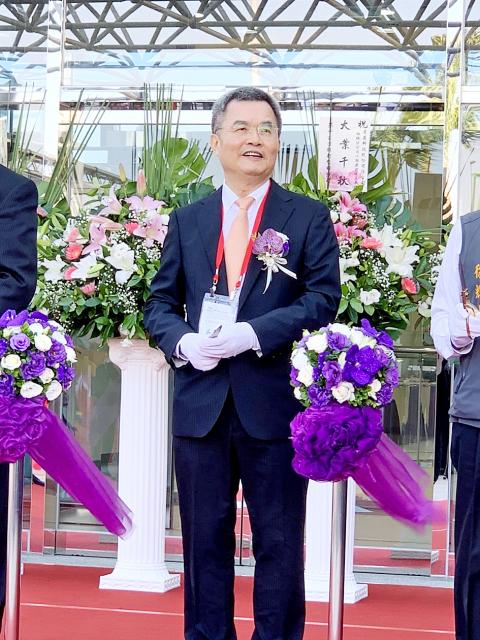Taimide Technology Inc (達邁科技) yesterday launched a new production line in Miaoli County, boosting its polyimide (PI) film capacity by 40 percent as it targets the growing demand for 5G foldable smartphones.
Taimide spent NT$1.8 billion (US$58.8 million), its biggest ever investment, building a new production line in Tongluo Industrial Park (銅鑼園區), as well as a research-and-development center.
The new production line is to add 600 tonnes of PI film to the company’s existing capacity of 1,500 tonnes a year, helping fuel revenue growth momentum, a Hsinchu Science Park Administration statement said.

Photo: Cho Yi-chun, Taipei Times
Fifteen companies have invested NT$112.61 billion to set up factories in the industrial park, which is part of the Hsinchu Science Park, the administration said.
About 65 percent of the PI film produced by Taimide is used to make flexible printed circuit boards that are used in a wide range of electronic products such as smartphones, wearable devices and laptops, as well as the automotive sector, the company said.
The company has developed a new optical-level colorless PI film that can be used in flexible OLED displays for foldable smartphones and other flexible displays, it said.
Huawei Technologies Co (華為) and Samsung Electronics Co have taken the lead in rolling out foldable smartphones this year and other handset brands are expected to follow suit, Taimide chairman Wu Sheng-chang (吳聲昌) said.
Taimide expects 5G smartphones to be a new growth driver for its revenue, Wu said.
The company has previously said that high-end smartphones consume 20 to 30 percent more PI film than mid to low-end smartphones.
Taimide expects to return to revenue growth next year as it benefits from the increased capacity and a broader product portfolio, the Central News Agency reported.
Taimide posted revenue of NT$1.33 billion in the first nine months of this year, down 24.7 percent from NT$1.77 billion in the same period last year.
The company attributed the decline to a prolonged US-China trade dispute, which has curtailed the sales of smartphones and other electronic products.

SEMICONDUCTORS: The firm has already completed one fab, which is to begin mass producing 2-nanomater chips next year, while two others are under construction Taiwan Semiconductor Manufacturing Co (TSMC, 台積電), the world’s largest contract chipmaker, plans to begin construction of its fourth and fifth wafer fabs in Kaohsiung next year, targeting the development of high-end processes. The two facilities — P4 and P5 — are part of TSMC’s production expansion program, which aims to build five fabs in Kaohsiung. TSMC facility division vice president Arthur Chuang (莊子壽) on Thursday said that the five facilities are expected to create 8,000 jobs. To respond to the fast-changing global semiconductor industry and escalating international competition, TSMC said it has to keep growing by expanding its production footprints. The P4 and P5

DOWNFALL: The Singapore-based oil magnate Lim Oon Kuin was accused of hiding US$800 million in losses and leaving 20 banks with substantial liabilities Former tycoon Lim Oon Kuin (林恩強) has been declared bankrupt in Singapore, following the collapse of his oil trading empire. The name of the founder of Hin Leong Trading Pte Ltd (興隆貿易) and his children Lim Huey Ching (林慧清) and Lim Chee Meng (林志朋) were listed as having been issued a bankruptcy order on Dec. 19, the government gazette showed. The younger Lims were directors at the company. Leow Quek Shiong and Seah Roh Lin of BDO Advisory Pte Ltd are the trustees, according to the gazette. At its peak, Hin Leong traded a range of oil products, made lubricants and operated loading

The growing popularity of Chinese sport utility vehicles and pickup trucks has shaken up Mexico’s luxury car market, hitting sales of traditionally dominant brands such as Mercedes-Benz and BMW. Mexicans are increasingly switching from traditionally dominant sedans to Chinese vehicles due to a combination of comfort, technology and price, industry experts say. It is no small feat in a country home to factories of foreign brands such as Audi and BMW, and where until a few years ago imported Chinese cars were stigmatized, as in other parts of the world. The high-end segment of the market registered a sales drop

Citigroup Inc and Bank of America Corp said they are leaving a global climate-banking group, becoming the latest Wall Street lenders to exit the coalition in the past month. In a statement, Citigroup said while it remains committed to achieving net zero emissions, it is exiting the Net-Zero Banking Alliance (NZBA). Bank of America said separately on Tuesday that it is also leaving NZBA, adding that it would continue to work with clients on reducing greenhouse gas emissions. The banks’ departure from NZBA follows Goldman Sachs Group Inc and Wells Fargo & Co. The largest US financial institutions are under increasing pressure